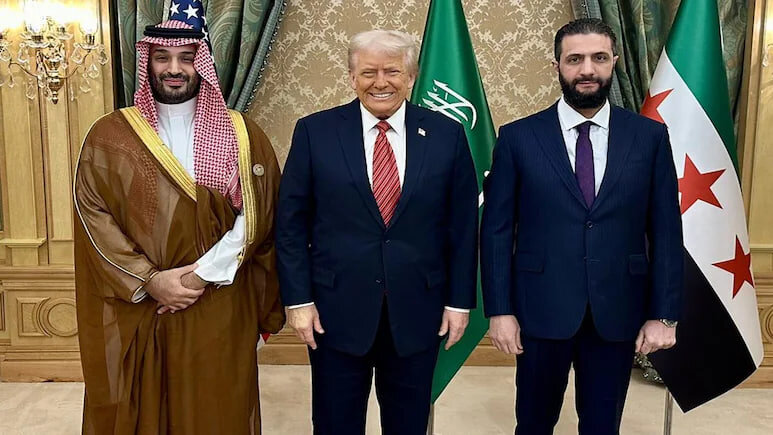Normalization process between Syria and Israel accelerating

BEIRUT — Israeli i24news revealed that an upcoming meeting in September—sponsored by President Donald Trump at the White House—will bring together Abu Muhammad al-Julani, Syria’s self-appointed president (currently known as Ahmed al-Sharaa), with Israeli Prime Minister Benjamin Netanyahu to sign a security agreement that will pave the way for a “peace” agreement.
The announcement came shortly after al-Julani’s visit to Abu Dhabi, which—according to the Hebrew channel—is playing a mediating role in the rapprochement between al-Julani’s government and the Israeli occupation regime.
I24news quoted an Arab Persian–Gulf source as claiming that the main obstacle to this Syrian-Israeli rapprochement is Tel Aviv’s unwillingness to commit itself to withdraw its forces from the areas it recently occupied in the Golan Heights, especially since al-Julani has not yet eliminated all the armed factions, particularly in southern Syria.
This matter prompts analysts to discuss the possibility of deploying American forces instead of Israeli ones, specifically in southern Syria, and forcing Israel to pay “rent” fees for one-third of the Golan Heights, with its “sovereignty” over the remaining two-thirds being recognized, where it seeks to establish a demilitarized zone.
Trump had already demanded that al-Julani end the activity of Palestinian resistance factions in Syria, amid his ongoing push to plunge as many Arab governments into the throes of normalization with the occupation regime, hoping to win the Nobel Peace Prize.
For his part, al-Julani seeks to consolidate his hardline rule and strengthen its control over the remaining crumbs of the Syrian cheese.
I24news stated that the meeting will take place before al-Julani’s participation in a meeting being prepared by the United States at the United Nations General Assembly, with the aim of removing him and Hayat Tahrir al-Sham (HTS) from the terrorist list.
Meanwhile, US envoy Thomas Barrack expressed hope that “Syrian-Lebanese relations will proceed along two parallel tracks that will converge soon.”
In an interview with the Lebanese channel LBCI, Barrack claimed that al-Julani’s regime “does not harbor hostile intentions toward Lebanon. The current interest of Syrian President Ahmad al-Sharaa’s regime is to remain in power and, frankly, to protect its leadership.”
The US envoy said that Washington currently views Lebanon, Israel, Jordan, and Iraq as part of a “new fabric” in the region, and that as Syria moves forward “so will Lebanon, because Lebanon is the corridor,” he claimed.
Barrack added that “the Lebanese and Syrians have been linked since the days of Bilad al-Sham [ the Levant].”
Regarding the viral news about the annexation of Lebanon’s Tripoli along other areas in Bekaa to Syria, Barrack claimed that this was “fantasy, an illusion, a caricature. I have not heard a single word about the annexation, nor has anyone reliable in our circles working with us in Syria spoken about it.”
When asked if he would return to Lebanon in two weeks with a “real breakthrough,” he replied, wondering: “I can assure you. There will be a breakthrough. Will there be a breakthrough that satisfies all Lebanese factions? That would be a miracle. But I am confident. Our commitment is clear. We will push this issue to its conclusion. And my belief, despite all the drama surrounding us, is that everyone is ready for it.”
The U.S. envoy claimed that all the components of the Lebanese government are ready for it: “Of course, when things mature, everything must be presented to the Council of Ministers. But the Lebanese Army is the focal point.”
Barrack reiterated his emphasis that the so-called “Hezbollah–problem is a Lebanese affair [...] How to resolve this internally is another matter,” accusing Hezbollah of being a “terrorist party.” He further noted that if it decides to surrender its weapons, “we will help, we will influence, and we will be a mediator between all the ‘combatants’ or adversaries on the borders [of Lebanon].”
The U.S. envoy claimed that the talk about timetables for fulfilling American pressure is inaccurate. When asked whether the situation in Lebanon could remain unchanged until the parliamentary elections in May 2026, he replied that Trump is impatient. “If Lebanon wanted to keep kicking the can down the road, they could, but we won’t be here next May discussing the same things.”
Barrack commented on Hezbollah Secretary-General Sheikh Naim Qassem’s statement that Hezbollah would never give up its weapons: “This is part of a typical Lebanese negotiation. In the bazaar, it’s the same thing. It’s a negotiation until everyone is truly ready to reach an agreement. Of course, each side will take the maximum possible of the opposing positions.”
He added: “We have to set a timeframe. When I say ‘we have to,’ I mean the Lebanese. As Americans, we are only here to facilitate the rapid exploitation of this opportunity. But we will not impose anything. We cannot.”
Asked about his confidence in Lebanese politicians, the U.S. envoy said, “I’m encouraged by their reactions so far, but I’m smart enough to understand that they’re playing backgammon, and I’m playing chess. They have to decide what their true commitment is. We’re giving them a chance to prove it, one by one.”
Barrack added, “Everyone is afraid. No one wants a civil war. No one wants to put too much pressure. You have a sectarian system, which requires consensus. All dialogue is taking place within this framework. We just respect this process.”
Regarding reconstruction, the U.S. envoy said that the Persian Gulf states are committed to it according to “the same principles that we demand: a real agreement, real timetables, real deadlines, real disarmament.”
